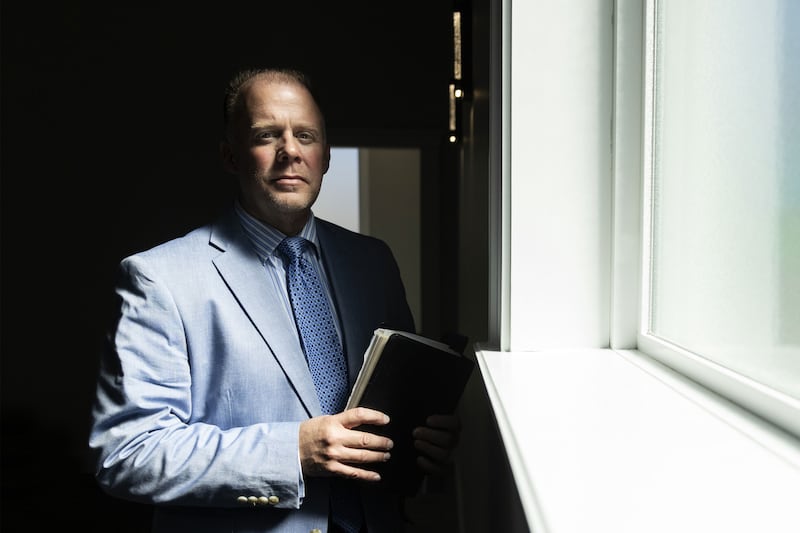The water thundered in and doused the land without mercy. It muddied every lawn, and it blunted the tree bark, and it drizzled off the shingles and into the driveways and gathered speed into the streets, where the currents found the drains and cascaded away. Nothing new in these mountains surrounding Asheville, North Carolina. Nothing worth noticing. Not until the early hours of Friday, September 27, 2024, in the dim light of the waning crescent moon, when a new kind of storm cloud arrived. It stirred Matthew Templeton in the night, its winds stretching and snapping branches of hemlock and oak. He watched the trunks sway and the limbs creak in the shadows outside his bedroom window, stuck somewhere between a typical nightmare and something more real.
He awoke again sometime between 6 and 7 a.m. The wind still howled, and now the water pelted the family’s five living room windows at a perpendicular angle. His wife, Heather, was already up, chatting on the phone with their oldest daughter in South Carolina. Now Matthew joined her marveling at the storm outside. Their younger daughter Jocelyn, a high school freshman, had planned to watch a Hallmark movie — a weather advisory had closed schools — but instead she, too, watched the windows. The pelting rain hosed the glass like a carwash jet. Meanwhile Titus, a redheaded high school senior, slept down the hall. A hunting rifle and a signed photograph of actor Mark Hamill decorated the walls around his bed.
Jocelyn and Titus’s father was many things. He worked in construction during the day, and as a Baptist pastor at night. But Matthew Templeton also had a hobby: an autograph collection that held thousands of pieces valued at hundreds of thousands of dollars. It had become something he and Titus worked on together — something lighthearted and fun that doubled as a source of secondary income. Matthew kept the artifacts in a rented storage unit two minutes down the mountain, near the banks of the swollen Swannanoa River.
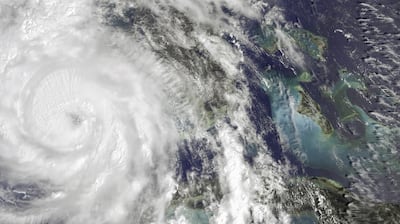
He’d been down to check on the storage unit just the day before. The building manager was in the parking lot, working to fortify the drain. Forecasts had warned about the approach of Hurricane Helene. No forecast, however, could have conveyed the scale of devastation that would come with it, with over 200 killed throughout the South and over 1,000 homes destroyed in western North Carolina alone. Helene swept 30-foot walls of moisture into mountain valleys far from the coasts where hurricanes tend to do their worst damage. It would leave Asheville without running water, working electricity and cell service for weeks and caused an estimated $53 billion in damage to key infrastructure. Its aftermath was downright apocalyptic, on a scale and of a severity rarely seen in the modern United States. Yet at the time, watching the storage unit building manager prepare the parking lot for the worst, Matthew didn’t think much of it. The next morning, still watching rain pelt the windows, an emergency alert flashed on his phone. It warned residents throughout the community of a nearby dam at capacity. It warned of catastrophic flooding. Matthew decided to make one more trip to the storage unit, to move what he could to higher shelves. Most of the collection was paper — posters and photographs and cards. Water would destroy it. If he acted quickly, he thought, a small flood wouldn’t mean the end of a 30-year project.
As he pulled on a pair of blue jeans, work boots and a white Carhartt jacket, Heather protested. “Do you really want to go out there now?” she asked. “Let it go.” But she also figured the storm wouldn’t be a huge deal because, frankly, most storms aren’t. Matthew would most likely go down there, move some boxes around and, should a small flood come through, their investment would be protected. In and out, he assured her. Ten minutes.
“Just be careful,” she told him as he smacked a ball cap onto his thinning gray buzzcut, sounding sincere but less than truly afraid. He would be careful, Matthew promised, and he meant it. He believed it.
He stepped outside, past a “God bless America” sigil affixed to the front door, and jogged to his F-250 pickup, an elbow held out to shield his face from the rain and gusts. Then he drove away, into the wet static and the unknown. He’d be back, he believed, in no time at all.
40 trillion gallons
He couldn’t reach the end of the block. Fallen trees clogged the way. He steered down the side streets until finally he found a clear path that took him toward the clubhouse of the Asheville Municipal Golf Course, adjacent to the storage unit building. Normally he might listen to 106.9 The Light, a Christian station founded decades ago by Billy Graham. Or to old-timey radio dramas. He loved the inflections in the voices, the emotions they could convey through sound alone. But today, the rain ricocheting off his window was the only sound in his cab. That and the frantic swiping of wiper blades, flapping away at their highest setting.

The river water had already begun to rise. He could see that now. But the banks of the Swannanoa were known to burst and sleek the grass on the course from time to time. That’s usually where it ended. On this day, though, Matthew’s truck bobbed into a dip in the road and the water there was deep enough to make him nervous. With another branch up ahead anyway, he decided to park at the clubhouse and walk the several hundred yards to the storage unit, right down the cart path of a par-4 fairway.
The wind was nearly enough to knock him over. It pushed him around on the asphalt like it was slicked with ice. Just enough to make his boots lose their grip on the ground and slide. Matthew was facing the very beginning of a tempest that would lead to scores of deaths and incalculable destruction. Yet approaching 8 a.m. that morning, the event still wasn’t entirely out of the ordinary. Western North Carolina is notoriously prone to flooding. The big one — until Helene redefined the term — came in 1916. Another hit in 1940. Then again in 2004. But none had ever quite done what Helene was about to do.
The grass surrounding the cart path, and the rest of the ground around Asheville, was already saturated from seasonal storms earlier in the week when Helene came ashore. The extra water the hurricane brought had nowhere to go, and as Matthew labored to get closer to the storage facility, a combination of factors was beginning to coalesce around him.
“When we look at the year ahead, especially from what we came out of, prayer time means a little bit more.”
Scientists point to climate change as one accelerant. Warmer temperatures mean more evaporation and an atmosphere capable of holding more moisture, which makes storms more powerful and more capable of dumping massive rainfall. Combined with Helene crashing directly into the Blue Ridge Mountains, which forced the system to rise, cool and morph from vapor to liquid water even more quickly than it otherwise would — a process known as “orographic lift” — the conditions were ideal for something biblical. In the end, Helene dumped 40 trillion gallons of water — enough to fill a completely empty Great Salt Lake four times over. None of which Matthew knew, of course, when he finally reached the glass-door entrance to the storage facility, got inside and went to work.
The drain in the parking lot, he’d noticed, was working as intended. The water wasn’t even an inch deep. But as he began to move his memorabilia to higher ground, he heard something. He glanced at the glass entrance doors and saw the water was now a foot high on the other side. Only a few minutes had passed. He started working faster. The water kept rising. Now he could hear it pushing through the tiny gap between the two glass doors, spraying onto the concrete floor inside. He threw his treasures with abandon, heaving them toward higher ground. The last one was a poster signed by Mickey Mantle, Ted Williams, Hank Aaron, Willie Mays and other baseball legends. Just as the poster landed atop the growing pile, one of the door’s glass panels blew out, shattering and echoing across the facility. He looked outside once more. The water was two, maybe three feet deep and rushing. It flowed straight into the storage facility, the door frame funneling its fury like a river rapid. Matthew knew his time was running out.
In the rush, he left his cellphone behind.
A date, a marriage and a minivan
Heather and Jocelyn looked out the windows and watched the trees tumble all around. It became a little game, wondering which one would next submit to the wind. They could hear the creaking and the cracking, and they’d run from window to window, trying to find the culprit. They watched as their neighbors’ timber just barely missed their own house. “Just 10 minutes,” Matthew had said. Now 10 minutes became 20 became 40, each ticking second making her sicker with dread. Heather tried calling. She tried texting.
“Where are you?”
“Call me back.”
“What’s taking so long?”
She fired off messages one after another in between paces across the living room. “Come sit down,” her daughter pleaded. But Heather kept moving. She needed the distraction. Her brain was taking her to uncomfortable places. Something just didn’t feel right. She could sense it just as surely as she could sense Matthew’s sincerity many years ago.
His maternal and paternal grandfathers had both been pastors in the Nazarene and Baptist traditions, while two of his uncles and three cousins also became preachers. He had wanted to be a biologist and had spent three semesters studying marine life in the Bahamas, but eventually he followed his father’s lead into construction. But he’d also worked in the ministry as a young man, through a program that brought kids from housing projects to church on Sunday. He’d driven buses and vans and helped build the program until it was 300 kids strong, attending the same church, Trinity Baptist, he attended all his life.
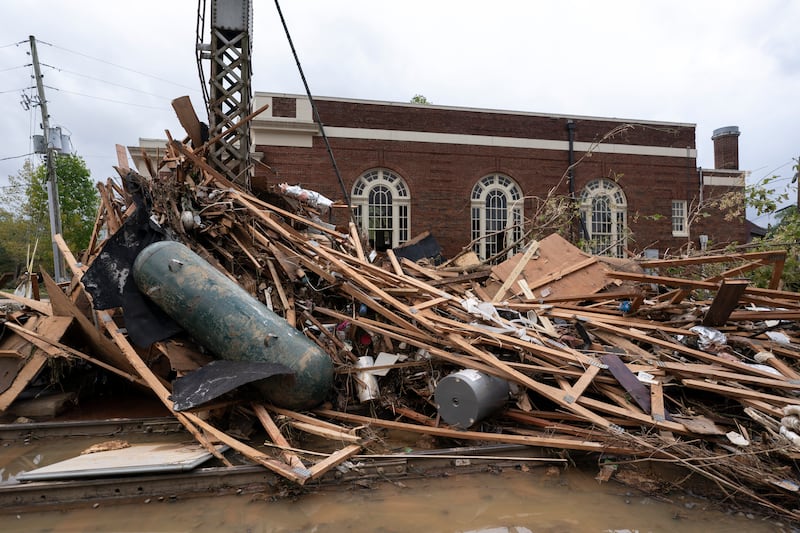
Heather wasn’t quite as rooted. She was born in Greenville, South Carolina, to a father who was in military special forces. After he retired, he became a Christian missionary in Berlin, where Heather lived both before and after the wall fell. She started going to Trinity Baptist sometime in high school, where she met Matthew. Only gradually did Matthew start to take notice of her wavy hair and her striking, bright eyes. He started to chat with her more after church. Then one night after a ball game in the early ‘90s, they ended up at a Pizza Hut at the same time with their friends. Heather and Matthew talked the entire night. That encounter became a formal date, a marriage, a mortgage, three kids, a minivan. Now she was desperately trying to reach Matthew on his cellphone, as the winds worsened and the rains raged.
Heather’s pace quickened. She looked out the door and wondered if she should go after him on foot. Then another branch snapped. She believed in divine intervention and the power of prayer. She knew her husband did, too, as co-pastor of a church called Aaron Baptist, where he’d become an interim pastor in 2020 when the church’s leader had to take a lengthy medical leave. Matthew, now 52, had been there ever since, splitting the duties with his predecessor. Heather knew that wherever he was, whatever danger he was facing, he would turn to prayer for strength.
She tried to do the same.
Power of prayer
Matthew rushed to the back of the building, hoping the exit there would be less overrun with water. But the river had already enveloped the structure and the water was already three, four feet high back there. He looked for weak spots in the roof. Places he could climb and kick his way to freedom. He found some — or so he figured — but they were more of a backup plan. If at all possible, he wanted to get out and get home right now. He tried not to panic, to move with purpose. He went back to the storage unit one last time in a futile search for his phone.
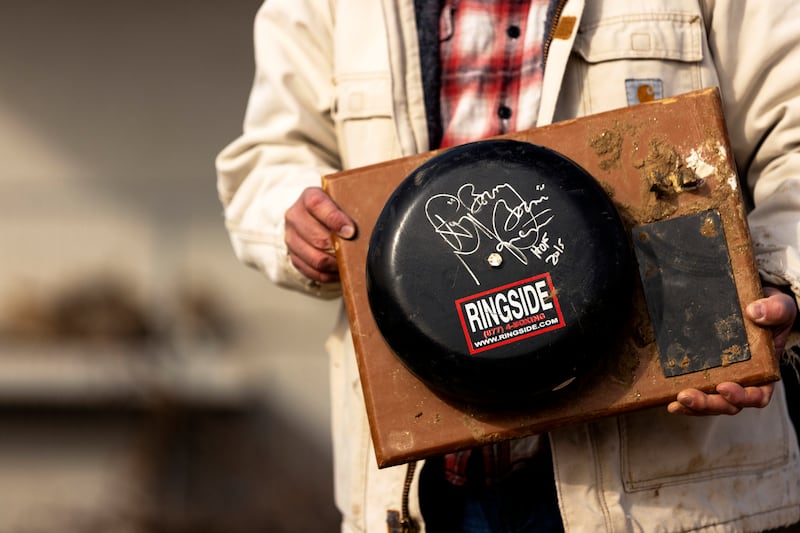
Seconds had become his only currency, and so, finally, he locked up the unit, placed the keys in his pocket and approached the main entrance. Just as he did, the glass from the second door blew out, and now a waist-high river rushed with full force down the hallway. He moved toward the right side of the door and tried to step through into the parking lot, but the current pushed him back in. He tried again. Again, he failed. He retreated down the hallway, toward the back of the building where the current was less strong, then scrambled back to the doorway, this time on the left side, and found a nook where the current’s power was diminished. Again he tried to walk into the river. Again the current threw him back inside. Still moving against the flow, still trying to figure a way out, he started to pray.
Matthew was a prayerful man in general, but this prayer wasn’t like the prayers he said out loud in church. It wasn’t lofty or polished or even frantic. He spoke straight from his soul. “Whatever I need in this moment — strength, wisdom, speed, insight — whatever it is, I’ll be grateful,” he said aloud. “I don’t want to die in this warehouse today.”
“Long before any military advancement, any government entity … the local church was 100 miles ahead.”
While the glass had been shattered, the building’s door frames remained locked and in place, and he noticed a thin metal bar running across the middle of them. He grabbed onto that bar and slowly swung himself over until he was sitting on the outside of the building, butt-to-bar, like a bird perched on a ledge. All around him the water still raged. It lapped at his boots and tried to pull him under, but he steadied himself. If he didn’t, he’d get tossed right back inside. Then he noticed a keypad to his left — the very same keypad he’d used earlier to enter the building. He grabbed on and used it as leverage to pull himself into another little corner nook where the current wasn’t as strong, this time just outside the building’s entrance. All the while, he continued to pray. “Whatever I need,” he said, “so I can get out of this place.”
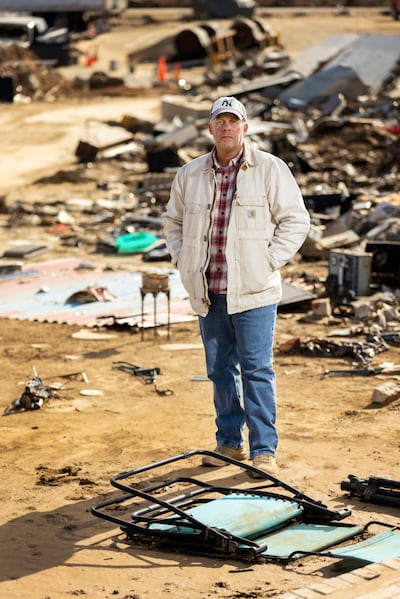
Using the mortar between the bricks on the building’s outer wall as makeshift fingerholds, he slowly worked his way toward higher ground. Behind him, he could hear the flow shredding the metal doors of the storage units, tearing them slowly, methodically, mercilessly apart. Moments ago, he had been there.
The water deepened, now reaching his chest. He could see nothing below the surface, murky and brown and carrying shrubs and trash and debris. His legs burned. His back ached. He kept moving anyway until his feet hit a small wall that felt about knee-high. He maneuvered over it and landed in water up to his chin. Without knowing what lurked below, without being able to see beneath his own neck, he noticed an elevated road 5, maybe 6 feet ahead.
With all his remaining strength, he lurched forward, grasping at something he could hardly see.
‘It’s all gone’
His palms found tangles tangles of brush and weeds and grass. He clung to them. He pulled himself slowly, then more quickly, until finally he was out of the flow and onto the asphalt just above it. He dropped to his hands and knees and looked down below him, from where he’d come. What had been a golf course and a network of streets and a collection of buildings was now a river that swallowed absolutely everything. “Thank you, Lord,” he said. “Thank you so much.”
He walked up the road back to the clubhouse, to his truck on higher ground. He realized right away that he couldn’t go back the same way he came. Even after clearing a small tree and finding a new route, he soon hit one dead end after another. Eventually he pulled off into the rough of the golf course and four-wheel-drived his way to a toppled elm tree four houses down. He knocked on his neighbor’s door, asking to park the truck there for now. “I can’t guarantee no trees are going to fall,” the neighbor said. “It’s fine,” Matthew said. All that mattered was getting home.
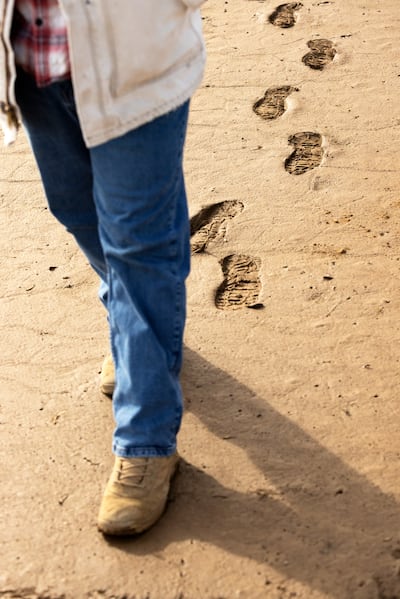
Ronon, the family’s black labradoodle, was the first to hear Matthew’s footsteps. He stood waiting at the door. Heather was confused. She could see there was no truck in the driveway. But then he appeared. Finally. Wet and cold and exhausted, but there. “Where have you been?” she asked, anger and relief merging into one emotion. “What did you do?”
Still moving against the flow, still trying to figure a way out, he started to pray.
Matthew dropped once more to his hands and knees, this time on the hardwood living room floor. “It’s gone,” he said. “It’s all gone.”
Titus emerged from his bedroom. Heather handed her husband a blue Gatorade from the kitchen. Between gulps and breaths, he clarified that what was “gone” was the collection. For Titus, that was a gut punch. The collection was supposed to pay for a new car to replace the family minivan Titus had totaled.
Those things mattered so much then. They seem so trivial now. A lot more than the collection, it turned out, was gone. The area Matthew had fled was ultimately buried under 31 feet of water, the storage unit included. Its steel support frames had been tipped over like dominos. There was no building left. Immediately, questions of “what if?” started to bubble.
What if Heather had gone with him to the storage facility? They both doubt they would have made it. What if he had decided to wait out the storm on the roof? He would have been swept away and lost forever. What if he’d managed to park his truck outside the entrance to the storage facility like he’d planned — would the water have pushed it into the door and blocked his exit? The questions kept coming, as Matthew and his family began to unpack what he’d endured — and what they were about to endure.
Big and little miracles
In January 2025, three-and-a-half months after the storm, the area around the building Matthew fled looked like a blast zone. Cars smashed and dented and marked with spray paint to denote them free of dead bodies. A sedan mangled beyond make and brand recognition rested atop a sideways trailer, its tires dangling loose on either side. A loveseat 20 feet high in a tree. A garage stripped bare to the beams, where Matthew heard several men had perished in the rafters as the water rose and they ran out of room. The only clue as to what actually caused the mayhem, all this destruction, were the layers of mud and silt that covered everything, still shaped by the lapping of waves.
In the first days, when Heather slept in their bed and Matthew slept on the couch cradling a shotgun aimed at potential looters, his mind would wander. It often wandered back, specifically, to what had been lost. Every once in a while he’d remember another item, and he’d stew. He’s not proud to admit that, when so many others lost so much more. And he did salvage a few things, at least, like a ringside bell signed by boxer Ray “Boom Boom” Mancini. But between the sirens of passing ambulances and the silence of a complete blackout and the shock of the destruction, he had little else to keep his mind occupied.
As the weeks passed, and the situation worsened, his thoughts shifted. He started considering more deeply the magnitude of what’d happened. Like those guys who’d drowned in the rafters within view of where he narrowly evaded death. He started avoiding driving down that way. He just didn’t want to deal with the memories, the adrenaline, any of it. He believed in the promises of heaven and eternity, even if he still sometimes lacked answers to certain questions.
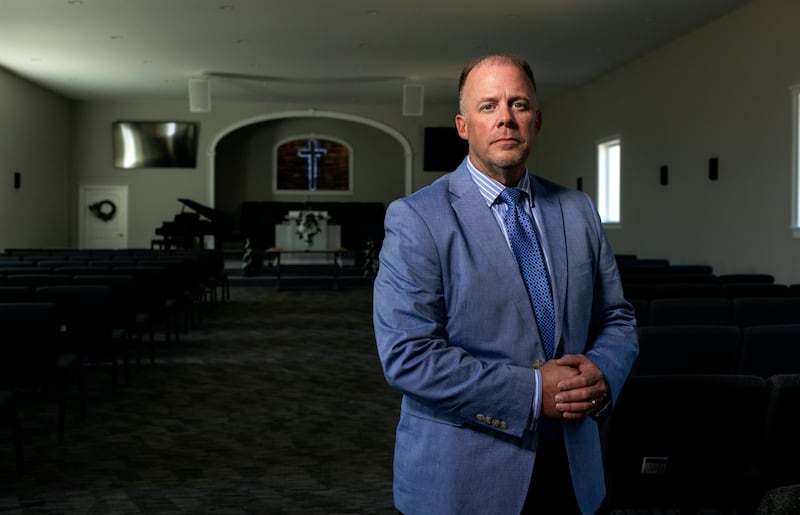
He started to get answers as the weeks became months. As the water came back on, he didn’t need to haul buckets to flush the family’s toilets. In little miracles, like the friend who reached out, unprompted, offering a free water storage tank. Or in bigger miracles, like the stacked food pantries and the community support.
Those first days were hard — people reduced to their primal selves, to base survival instincts. Rumors swirled of active shooters at gas stations, of people fighting over gasoline and resources. True or not, the result was a pervasive sense of fear and foreboding. “Nobody talked to each other,” Titus said. “Nobody wanted to talk to each other.”
Just a few days after the storm had hit, the family visited a local mall in search of Wi-Fi. They found the parking lot completely full, wrapped by a circle of running cars, and overrun with cops. They weren’t even sure why; maybe, like them, the other folks had heard rumors of Wi-Fi access. Or maybe they’d heard other rumblings that the mall had diapers and wipes and water stations. Nobody really knew anything at the time. Yet curiously, “nobody was fighting for a place in line,” Heather said. And when she looked at their faces, what she saw makes her want to cry to this day. “It was just blank fear,” she said. “We were so desperate, just desperate. And I wanted to help everybody, but I didn’t even know how to help myself. We were just seeing this desperate situation getting worse and worse.”
The hurricane dumped 40 trillion gallons — enough to fill a completely empty Great Salt Lake four times over.
But it didn’t last. And that’s what they hold onto.
The churches, especially, played a vital role in distributing food and other resources. Matthew marveled at the donations that flowed. His own church had to remove several rows of seating to accommodate the excess. “I would debate anybody, any day of the week, that the face of this storm was the local church,” he says. “Long before any military advancement, any government entity, any federal, state, local — before anybody put a fingerprint on any of this, the local church was 100 miles ahead.” That helped him heal. It helped him appreciate the little things, the most important things.
The anchor of belief
On a 20-degree Wednesday evening in January, Matthew and his family visited Aaron Baptist for a weekly Bible study. Because of the frigid weather, only two other members joined them. Matthew began by leading a hymn — a matter-of-fact rendition of “What a Friend We Have in Jesus,” which celebrates the virtues of prayer. “When we look at the year ahead, especially from what we came out of, prayer time means a little bit more,” he said later. “Just knowing that I’m sitting at the table praying with my family around me, means a lot more to me these days.”

He certainly had much to be grateful for. Survival aside, Hurricane Helene didn’t do much damage to the church itself. A lucky break, since just two years ago it underwent massive renovations. What had been rows of 12-foot oak pews had already been donated to two sister churches, replaced by cushioned, individual gray seats that were easier to move around — which came in handy when they needed to make space for pallets of water and canned goods. Matthew and his team had made other adjustments prior to the storm. They widened the pulpit, opened the entranceway wider. Most of all, though, they tore down the steeple.
Steeples, Matthew says, are almost impossible to maintain. Their shape — jutting up into the air, defiant — leaves them vulnerable to cracks and ice and water damage. The one at Aaron Baptist leaked constantly. “I guess that’s just the plight of steeples,” he said. It would have cost $18,000 to repair the one they had, or $26,000 to replace it with a new one. So Matthew and his co-pastor decided to scrap it instead.
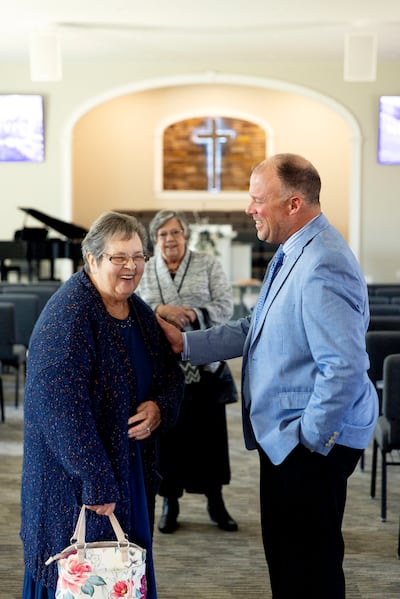
Many in the congregation — especially some of the older members — were dumbfounded. What was a proper Southern church, after all, without a steeple? It felt like something essential had changed. Like something had been lost that could not be put back again. But over time, their anguish gave way to hope, especially after Hurricane Helene. Their church still stood. It was more comfortable and more complete than ever, in fact. And steeple or not, they could still gather like they did now, Matthew Templeton standing before them as a living reminder that belief finds its meaning not in what reaches skyward, but in what anchors us through the storm.
This story appears in the April 2025 issue of Deseret Magazine. Learn more about how to subscribe.

